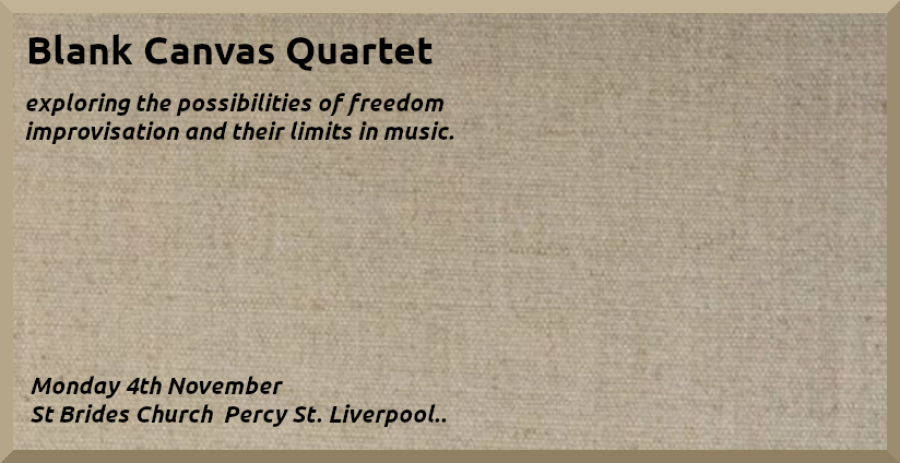Introduction
The names.
MATHEW PHILLIPS, cello.
NICK BRANTON, clarinet, reeds.
PHIL MORTON, accidents and treatments.
METTY METCALFE. drumset.
The goal is to
- Create something new in a musical sense owned by those present
- Explore the possibilities of freedom and improvisation and their limits.
The approach is to
- Shape the sound with silence.
- Shape the ensemble size: moment by moment.
-
Empower musicians with agency in their contributions. Shape the music through active listening.
This is achieved by
- The application of `System 50:50 for improvisers` refer to the tab system 50:50 for more information
- The use of a chess clock!
Expect to hear:
A diversity of sounds, shifting foregrounds led by changing personalities sprinkled with timbral melds, unexpected silences, melodies and kitchen clatter.
The session
Venue: St Brides Church, Percy Street, Liverpool
Date: 04.11.2024
Get in time: 19.00 for the musicians
Doors: for the public,19.00
Start time, concert:19.30
Number of sets: two sets are planed. Both thirty six minutes long. A short third set (ten minutes) is optional.
End time (concert): on or before 21.15
All out: feet on the street, on or before : 21.30 hours
Admission, audience: £5 or by donation
Tickets: are displayed when available at discount at the following eventbrite account: CLICK HERE
Subs from players: not applicable.
Schedule
Dates for your diary
- This is the inaugral event of this iteration of this ensemble.
- A schedule will appear after it has been created.
Tickets
Tickets for the audience
Admission for the audience on the day is £5.00 or by donation.
Adnvance tickets for the audience will be made available through the Eventbrite website. details to follow.
About System 50:50
The goal is to
- Create something new in a musical sense owned by those present
- Explore the possibilities of freedom and improvisation and their limits.
The approach is to
- Shape the sound with silence.
- Shape the ensemble size: moment by moment.
-
Empower musicians with agency in their contributions. Shape the music through active listening.
Expect to hear:
A diversity of sounds, shifting foregrounds led by changing personalities sprinkled with timbral melds, unexpected silences, melodies and kitchen clatter.
Description
The duration of the piece is agreed before the start of the performance..
A performer must play for 50% of the duration of the piece and remain silent for 50% of the duration of the piece
Example
If the duration of the piece is 16 minutes, the performer plays for 8 minutes and is silent for 8 mins. Each player is free to choose when they play and when they are silent within the duration of the piece but they must have a 50/50 balance between playing and being silent. It is expected that each player will improvise their music.
Quick summary using 50:50 ratio
Each player `improvises` for 50% of the piece
Each player is `tacet` for 50% of the piece
The totals are aggregated
Each player/improviser has their own clock and manages their own time
Each player has `agency` over the content they share during the performance.
System 50:50 for improvisers - Click the link for a detailed description and history.
https://www.improvisersnetworks.online/system-50-50-an-introduction
Delivered by the primary and preferred time management option:
Mechanical chess clocks are required to facilitate the aim of the system. One of the pair of dials is called ‘tacet’ and the other ‘free play’.See image above. Each performer has an individual chess clock to monitor and manage their contribution. The performer plays when the ‘free play’ dial is running down and is silent when the ‘tacet’ dial is running down.
Youtube demonstration, Duration 1 minute Ratio 50:50 or 1:1 Content, is speech, status managed by the rocker (lever): URL LINK
Link to image of an adapted chess clock URL LINK
Selected feedback about system 50:50
Simon Ross (Macclesfield), Blank Canvas Octet - Liverpool
System 50/50 works well - it’s a really good way to get a group to play effectively without egos , virtuosity , and shyness getting in the way. It is democratic, inclusive. coherent, leaderless, focused, there is room to think and time to listen, choices. It is less competitive more cooperative. Ends well.
Charlie Collins Sheffield
On system 50:50 “Definitely something with LOADS of possibilities - the reaction in the car driving back was unbelievably positive - no one could remember playing in a large ensemble that was so "open". The openness allowed me to play quietly, which meant the dynamics were incredible for an improvising large ensemble.”
Dan Goren, Oxford Improvisers.
`"It seems to me that any attempt to restrict what free improvisers play, presents a threat to the core nature of their music. Generally, 'To play or not play' is about as far as any predetermination can productively go, the player retaining (almost!) complete formal agency regarding when and what (s)he decides to play"
Richard Harding Liverpool.
``Sometimes in free improv it is just not working but we carry on in the hope it will get better, in system 50:50 if it (free improv) is not working one can select tacet and stop playing`
Jon Aveyard, Lecturer UCLan University England
`It gives me permission to do nothing`
Helen Conning, Liverpool.
It is democratic
Maggie Nicol - West Wales.
I want to buy twelve 50:50 clocks
Office use
RTM

Tags
events and concerts UK
London newsfeed
system 50;50
sys5050mclist
Workshops UK
the checklist is here
https://www.rememberthemilk.com/app/#search/article/931320458
{slider=Bank Holidays}
UK Bank Holidays
to follow

